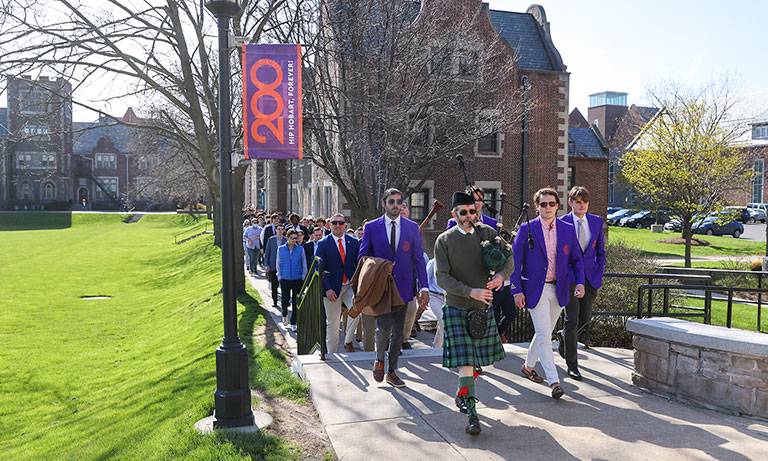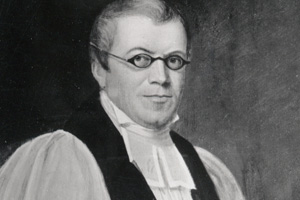
Charter Day
College convocations began early in the 19th century. By the Civil War period, these events included participation by faculty, alumni and students in Class Day celebrations. By the mid-20th century, they were called Moving Up Day and Charter Day. Today's event celebrates not only the students and their accomplishments, but also the founding and chartering of the College in 1822.
HOBART COLLEGE'S FOUNDING

When Bishop John Henry Hobart visited Geneva in 1818 on his annual visitation of the Episcopal Diocese of New York, he found a thriving community with a population of 1,500, a hotel, a municipal water system, a post office, a public school, a library, a newspaper, and an active social life. Impressed with Geneva's development and the beauty of its surroundings, Bishop Hobart believed that Geneva, with its strategic location, would be an ideal place to establish an institution, not only of learning but also for religious worship and instruction to aid the Church and its Ministry.
Bishop Hobart met with Trustees of Geneva Academy to outline his vision. The Academy had been organized in 1796 and granted a charter in 1813. The Bishop proposed to use the corporate foundation of the Academy, if the Trustees would petition for a college charter. Also required was the construction of a new building for the Academy. The next morning the Bishop met with a few of the Trustees to determine a location for the proposed college. The Bishop chose the South Main Street site for its lake view and its proximity to the community. In 1821, with donations from the citizens of Geneva, the construction of Geneva Hall began on this site. On April 10, 1822, a provisional college charter was granted. After meeting certain conditions of the provisional charter, a permanent charter for Geneva College was received on February 8, 1825. Geneva College became Hobart Free College in 1852 and Hobart College in 1860.
CHARTER DAY
College convocations began early in the 19th century. By the Civil War period, these events included participation by faculty, alumni and students in Class Day celebrations. By the mid-20th century, they were called Moving Up Day and Charter Day. Today's event celebrates not only the students and their accomplishments, but also the founding and chartering of the College in 1822.
THE HONOR SOCIETIES
The Druid Society for seniors, founded in 1903, defines the highest goals for a Hobart student: character, leadership and loyalty. The Druids are the guardians of Hobart traditions and advise the Dean and President on matters relating to Hobart heritage and customs.
The Chimera Society for juniors (1903) takes as its emblem a mythical creature with a lion's head, a goat's body and a serpent's tail. The students of Chimera are chosen on the basis of their many accomplishments and service to the Colleges.
The Orange Key Society for sophomores (1926) recognizes those who have had an exceptional first year at Hobart based on scholarship, leadership and accomplishments. Its emblem, the orange key superimposed on a purple “H,” represents the liberal arts education that Hobart students receive.
THE ALMA MATER
Music by Charles J. Rose from the Class of 1876
Lyrics by Edward J. Cook from the Class of 1895
The alma mater was first performed at the Hobart Glee Club's inaugural performance in December of 1900 under the direction of Professor of Modern Languages Charles J. Rose '76, who is credited as the musical author. Professor Rose, according to The Hobart Song Book, was “a student of the Royal Conservatory of Music in Stuttgart, Germany.” The words were written by Edward J. Cook, Class of 1895, at the request of the literary editor of the 1896 Echo of Seneca yearbook, where the song was first published. The phrase “Hip Hobart,” which is featured prominently throughout the song, is derived from the college cheer that was popular at sporting events of the day.
Alma Mater
Evermore thy sons shall be
Hip Hobart, my Hip Hobart,
Champions bold of liberty
Hip Hobart, my Hip Hobart;
Ever shall thy champions prove
Filled with brave unchanging love,
Lifting souls to heights above
Hip Hobart, my Hip Hobart.
Evermore thy fame shall last
Hip Hobart, my Hip Hobart,
Glorious still as in the past
Hip Hobart, my Hip Hobart;
With a faith and courage strong
Battling ever ‘gainst the wrong,
Honors great to thee belong,
Hip Hobart, my Hip Hobart.
Chorus
Raise the orange and purple high,
Let us shame them never,
Shout the triumph to the sky,
“Hip Hobart, forever!”
